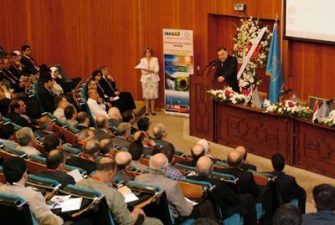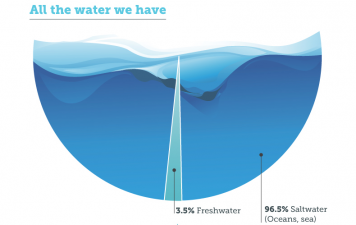 Water scarcity is not a new dilemma in the Middle East, but as populations grow, desertification spreads and temperatures creep higher, leaders in the region are understandably concerned for the future. Poorer countries like Yemen or the Hashemite kingdom of Jordan are particularly vulnerable, while oil-rich nations can at least use their wealth to explore new technologies aimed at boosting groundwater supplies.
Water scarcity is not a new dilemma in the Middle East, but as populations grow, desertification spreads and temperatures creep higher, leaders in the region are understandably concerned for the future. Poorer countries like Yemen or the Hashemite kingdom of Jordan are particularly vulnerable, while oil-rich nations can at least use their wealth to explore new technologies aimed at boosting groundwater supplies.
Which is how in 2002 the United Arab Emirates came to initiate a cloud-seeding program that allegedly increases precipitation by 20%.
Already concerned about water supplies a decade ago, the late President Sheikh Zayed of the United Arab Emirates (UAE) launched a study that detailed the efficacy of cloud-seeding.
This process involves sending manned planes into specific kinds of clouds as they are forming, and boosting their precipitation output by shooting into their belly flares containing calcium and potassium chloride. These salts expand when water molecules attach to them, according to The National, eventually forcing the cloud to push them out as rain.
The UAE is the only nation that has consistently produced results with their cloud-seeding program, in part because of the folks at the National Center for Meterology and Seismology (NCMS) whose job it is to monitor cloud formations.
By watching data that streams in from 50 weather stations throughout the UAE, meteorologists at the NCMS outside Abu Dhabi are able to predict the formation of very specific cloud formations. And once they do, there is a tiny window of opportunity for them to dispatch one out of four pilots to shoot flares into the cloud.
This procedure takes place more frequently during summer. Two of the planes carry ten flares while the remaining two, which are newer, carry 20 flares a piece.
“Up until now, this is the main successful way to save water,” Senior forecaster Ali Mohammed Al Musallam told The National. “But the experimentation cannot stop at this point. We cannot just rely on this. We have to do more studies. We need to follow what is happening outside in the world.”
Meanwhile, researchers in Tel Aviv found that seeding clouds doesn’t work. It may be better just to dance.
:: The National




Comments are closed.